|
| NEWS |
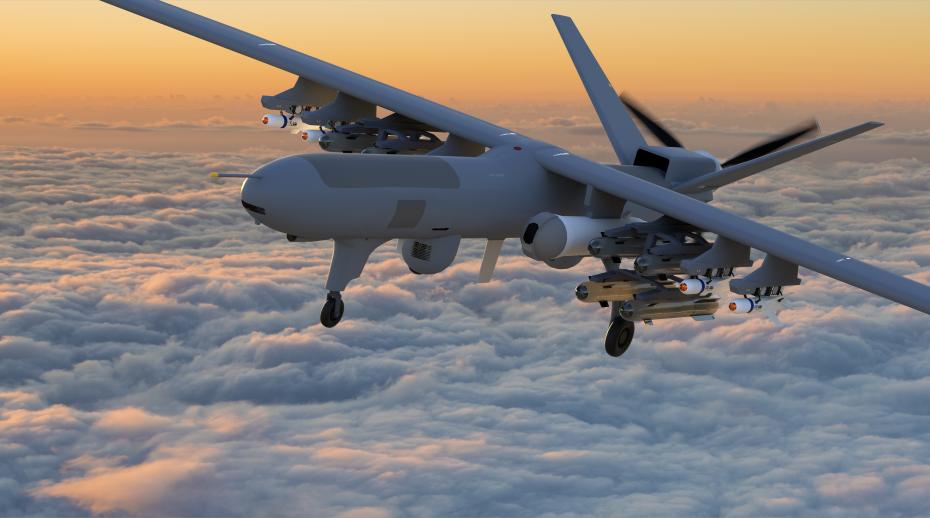 |
| Business as usual? Arms sales of SIPRI Top 100 arms companies continue to grow amid pandemic |
| On 6 December, SIPRI released its data set on the arms sales of the world’s largest arms companies. Sales of arms and military services by the industry’s 100 largest companies totalled $531 billion in 2020—an increase of 1.3 per cent in real terms compared with the previous year. The arms sales of the Top 100 arms companies in 2020 were 17 per cent higher than in 2015—the first year for which SIPRI included data on Chinese firms. This marked the sixth consecutive year of growth in arms sales by the Top 100. Arms sales increased even as the global economy contracted by 3.1 per cent during the first year of the pandemic. |
|
|
Read more | Download the SIPRI Fact Sheet | Access the SIPRI Arms Industry Database
|
|
|
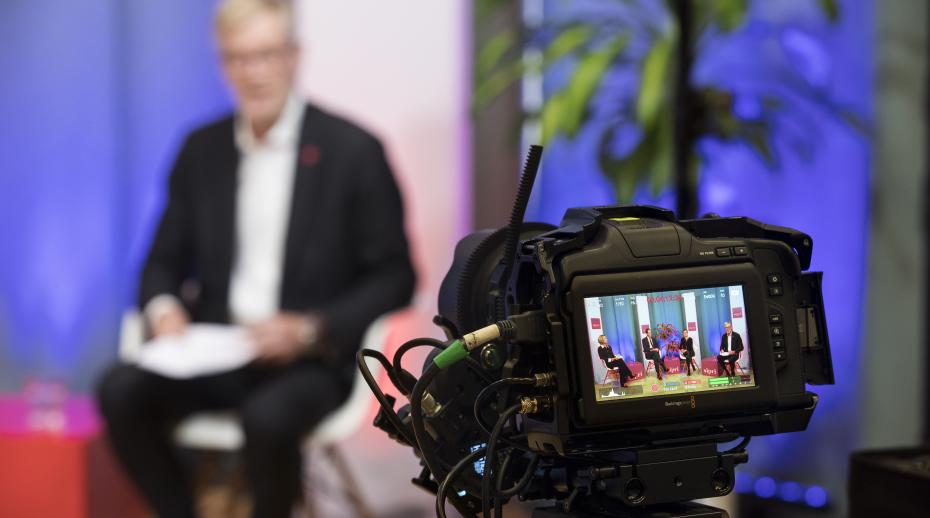 |
| 2021 Stockholm Security Conference: Session videos now available |
|
SIPRI hosted the sixth annual Stockholm Security Conference in a virtual format on 8–11 November. Videos from all the public sessions are now available on SIPRI’s YouTube channel. The conference featured 15 sessions on the theme of ‘Battlefields of the Future: Trends of Conflict and Warfare in the 21st Century’. So far, the opening panel has engaged over 1600 viewers, while the thematic sessions reached a global audience of more than 870 unique attendees.
|
|
|
Read more | Watch the Stockholm Security Conference playlist
|
|
|
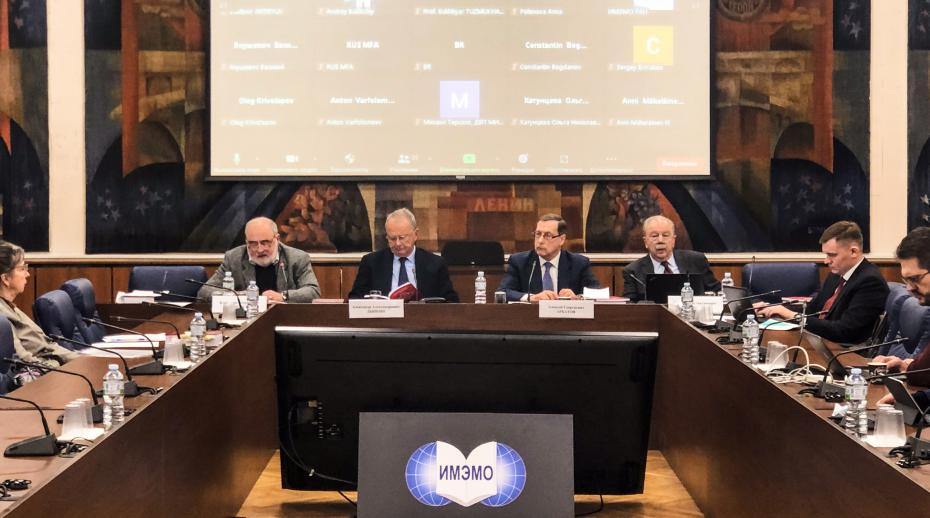 |
| Russian translation of SIPRI Yearbook 2020 now available |
|
On 23 November, SIPRI, in collaboration with the Primakov National Research Institute of World Economy and International Relations (IMEMO), launched the Russian language translation of SIPRI Yearbook 2020. The launch event included a presentation of the supplement to the translation, Russia: Arms Control, Disarmament and International Security.
|
|
|
Read more | Download the Russian translation (PDF) |
Download the supplement to the translation (PDF)
|
|
|
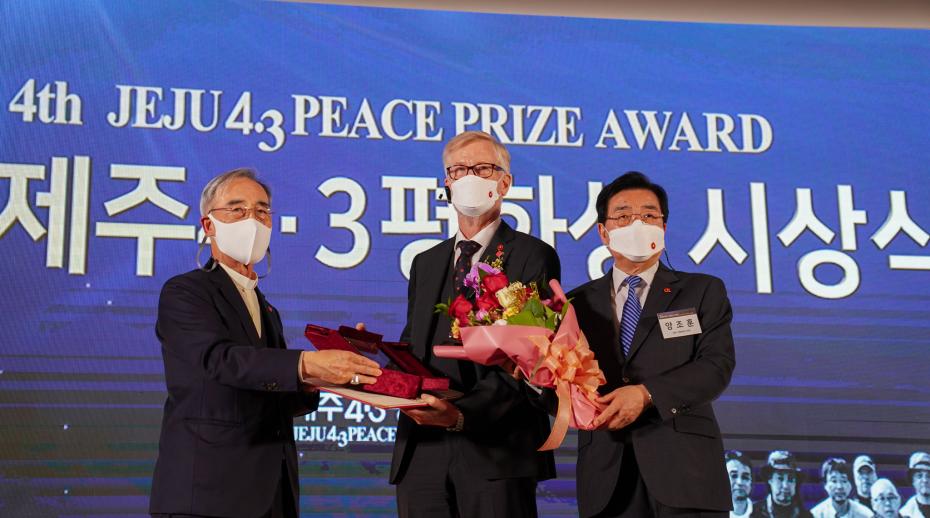 |
| SIPRI Director awarded the Jeju 4·3 Peace Prize |
| Dan Smith, SIPRI Director, has been awarded the fourth Jeju 4·3 Peace Prize for his research and work on security, reconciliation and peacebuilding in many parts of the world, especially the Korean Peninsula. The prize was presented in person on 30 November at the Jeju KAL Hotel, Jeju Island, South Korea. |
|
|
Read more | Watch the live stream of the ceremony
|
|
|
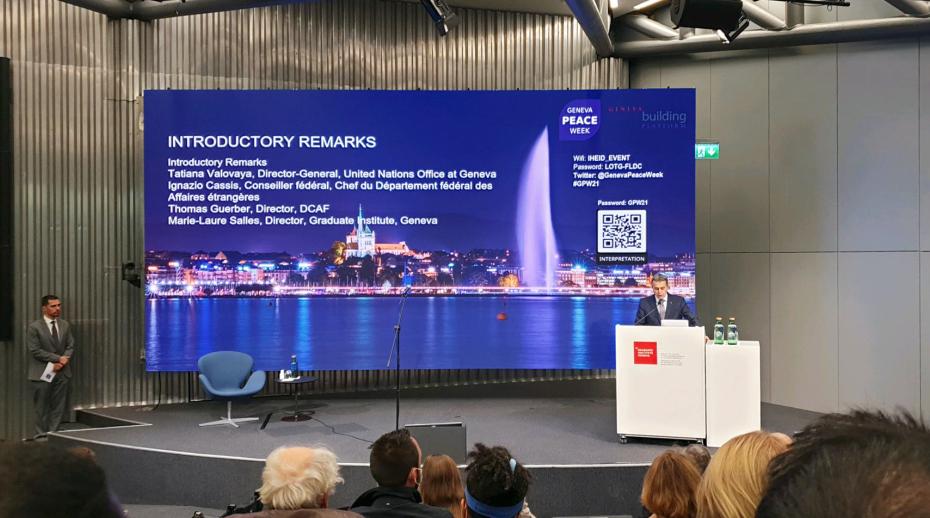 |
| SIPRI’s Environment of Peace initiative at Geneva Peace Week 2021 |
| On 3 November, SIPRI’s Environment of Peace initiative hosted a virtual workshop at this year’s Geneva Peace Week on the theme ‘Policy Pathways for an Environment of Peace’. The event explored recommendations for environmental governance and resource management that can help to lay the foundations for a socially, economically and politically resilient peace. The workshop discussions will feed into the Environment of Peace report, which will be launched in May next year at the Stockholm Forum on Peace and Development. |
|
|
Read more | Read more about the Environment of Peace initiative
|
|
|
 |
| Conversation: Cash-based transfers in Lebanon |
| In this SIPRI Conversation video, Stephanie Blenckner speaks with Dr Kristina Tschunkert, Researcher with SIPRI’s Food, Security and Peace Programme, about cash-based transfers and how they improve the prospects for peace in Lebanon. |
|
|
Watch the SIPRI Conversation | Access the SIPRI Conversation playlist
|
|
|
 |
|
|
|
| COMMENTARY |
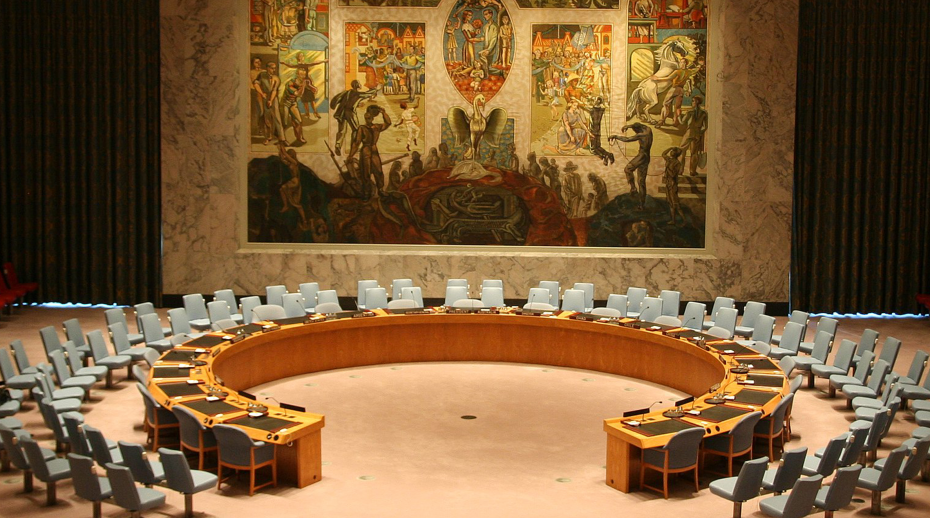 |
| Russia’s ‘nyet’ on a climate security resolution does not mean the issue is off the Security Council agenda |
|
Earlier this week, Russia used its veto in the United Nations Security Council to block a thematic resolution on climate change and security put forward by Ireland and Niger. While the draft resolution contained specific actions, its main purpose was symbolic: to put the security implications of climate change firmly on the Security Council’s agenda, much as Resolution 1325 did with women, peace and security. This SIPRI Expert Comment asks what was gained by this initiative, and what was lost. And more importantly: what now?
|
|
Read the SIPRI Expert Comment
|
|
|
 |
| Russia’s anti-satellite test should lead to a multilateral ban |
|
On 15 November, Russia conducted a direct-ascent anti-satellite (DA-ASAT) test, destroying one of its own space objects, a defunct satellite, in low-earth orbit. The drivers behind Russia’s test are unclear and official statements do not reveal what prompted it. However, the test and the international response to it have arguably improved the prospects for an urgently needed, outright international ban on debris-creating ASAT tests. This SIPRI Essay lays out the dangers of space debris and calls for accelerated discussions on a multilateral ban on destructive ASAT tests.
|
|
Read the SIPRI Essay
|
|
|
|
| RECENT EVENTS |
| |
| 14 December 2021 |
| Nuclear Disarmament and Arms Control: The State of Play |
|
On 14 December, SIPRI co-hosted an event with the Alva Myrdal Centre for Nuclear Disarmament at Uppsala University (AMC) to consider the prospects for nuclear arms control and disarmament. This webinar featured leading scholars and practitioners, who shared their visions of the state of play of nuclear disarmament and arms control. It was the first in a series of workshops organized by SIPRI and AMC to explore the legal and political aspects of nuclear disarmament.
|
|
Read more
|
|
| |
| 22–25 November 2021 |
| SIPRI co-convenes dialogue meetings in Geneva on peace operations and non-traditional security challenges |
|
On 22–25 November, SIPRI and the Friedrich-Ebert-Stiftung held two dialogue events as part of a series that seeks to enhance understanding of UN and non-UN multilateral peace operations and non-traditional security challenges. The meeting on 22–23 November discussed peace operations, epidemics and pandemics. On 24–25 November, the dialogue meeting focused on the challenges of environmental degradation and resource scarcity.
|
|
Read more
|
|
| |
| 10–11 November 2021 |
| SIPRI co-convenes meeting in Dakar on climate change and security in West Africa |
|
On 10–11 November, SIPRI, in cooperation with Friedrich-Ebert-Stiftung and the Norwegian Institute of International Affairs (NUPI), convened the first meeting of a Regional Climate Security Working Group for West Africa. The objective of the working group is to map and link experts on climate security and build a common understanding across key groups in the region. Participants explored ways of amplifying regional voices for better addressing the links between climate change and conflict in West Africa.
|
|
Read more
|
|
|
| STAFF NEWS |
One current opening
SIPRI is currently recruiting for one position:
- Research Assistant, Middle East and North Africa Programme (Closing date: 4 January).
|
|
Read more
|
|
|
| PUBLICATIONS |
 |
| Reform Within the System: Governance in Iraq and Lebanon |
| The 2019 protests in Iraq and Lebanon revealed a widespread dissatisfaction with political systems based on sectarian and ethnosectarian power-sharing, which many saw as being responsible for a host of governance failures. This has given rise to demands for a wholesale change of the political systems in both countries. Although a comprehensive reform remains a remote prospect, this set of SIPRI publications, based on interviews with current and former government-level officials and experts, explores what can be done in the short term to address some of the key challenges confronting the two countries. |
|
Read the SIPRI Policy Paper | Read the SIPRI Policy Brief on Iraq | Read the SIPRI Policy Brief on Lebanon
|
|
|
 |
| Food Systems in Conflict and Peacebuilding Settings: Case Studies of Venezuela and Yemen |
| This SIPRI Report, which is the second in a three-part series, sets out the pathways and interconnections between food systems, hunger, violent conflict and peace. Using Venezuela and Yemen as case studies, it elucidates possible ways out of the countries’ respective crises and gives a contextual understanding of the discussion in the first paper in the series. It ends with four recommendations intended to inform the development of better designed interventions which can limit the long-term consequences of conflict and food insecurity. |
|
Read the SIPRI Report
|
|
|
 |
| Post-shipment On-site Inspections of Military Materiel: Challenges and Responses |
| Post-shipment on-site inspections enable a state to perform checks on exported military materiel after they have been delivered. This SIPRI Policy Brief is intended to inform the various national processes currently underway that are connected to the adoption and implementation of on-site inspections as well as ongoing discussions within the Arms Trade Treaty about their role in helping to prevent diversion of military materiel. The brief examines the challenges encountered by states in connection with adopting, requiring and conducting on-site inspections and provides examples of practices that have been used in response. |
|
Read the SIPRI Policy Brief
|
|
|
 |
| The SIPRI Top 100 Arms-producing and Military Services Companies, 2020 |
| The combined arms sales of the world’s largest arms-producing and military services companies were $531 billion in 2020—an increase of 1.3 per cent on their arms sales in 2019. Despite this being the smallest increase in arms sales among the Top 100 in three years, the data shows a continuous upward trend since 2015, roughly correlating with rising global military expenditure levels. This fact sheet lists the SIPRI Top 100 for 2020 from the updated SIPRI Arms Industry Database and describes the trends in international arms sales that are revealed by the new data. |
|
Read the SIPRI Fact Sheet
|
|
|
 |
| SIPRI Yearbook 2021 |
SIPRI Yearbook 2021 presents a combination of original data in areas such as world military expenditure, international arms transfers, arms production, nuclear forces, armed conflicts and multilateral peace operations with state-of-the-art analysis of important aspects of arms control, peace and international security. It covers developments during 2020, including:
- the state of nuclear arms control and the entry into force of the 2017 Treaty on the Prohibition of Nuclear Weapons;
- efforts to regulate lethal autonomous weapon systems, and state behaviour in cyberspace and space;
- regional and country-specific overviews of armed conflicts; and
- the impact of the unfolding Covid-19 pandemic and the UN appeal for a global ceasefire to address it.
|
|
Browse the contents page | Download the summary (PDF) |
Order SIPRI Yearbook 2021 | Download the sample chapter on world nuclear forces (PDF)
|
|
|
| |
|
|
|